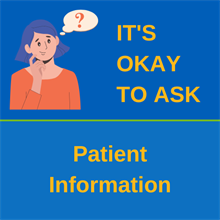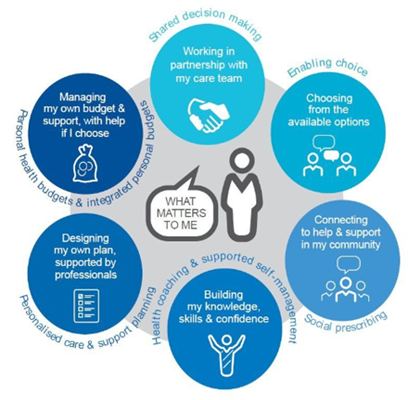
Prepared toolkit for professionals

Prepared patients enable effective shared decision-making conversations, a key component of providing Personalised Care.
This toolkit is designed for healthcare professions to provide a consistent message to all patients, that it is okay to ask.
The information below is available for patients to assist them ask those questions that are important to them during their care with us.
What matters to you?
Please tell us and ask questions about your healthcare.
By asking questions about your care you can make sure:
- Your individual needs are prioritised.
- You understand the benefits and risks of the different options.
- You can make a choice that suits you best.
Many appointments are now being carried out over the telephone or online. If this is difficult for you, please speak to a member of staff in the service or contact PALS on 02476 865550 or via email at pals
It might be helpful to think about:
- What is my main concern?
- What do I want to achieve from my appointment?
- Why is this important to me?
Don't forget:
- Make a list of your current medications.
- Think about whether you want to bring someone with you to your appointment.
By the end of your appointment you should know the answers to these questions:
- What are my options?
- What are the benefits and risks of each option for me?
- What happens next?
- Who do I contact if I have questions after I leave?
- Where can I go to get more information?
Remember you can always ask the healthcare professional to explain things different, explain things again, or to write down information for you.
You might want to discuss your options with friends and family.
- It's okay to change your mind.
- It's okay to go back to your healthcare professional to ask more questions or explain anything you didn't understand.
- Keep a note of any questions ready for your next appointment.
- It's okay to ask a pharmacist or healthcare professional if you are confused about prescriptions.

Personalised care represents a new relationship between people, professionals and the system. People access personalised care through six key components. This model demonstrates how these come together to deliver an all age, whole population approach to personalised care.

- Achieve better experiences and health outcomes for people by embedding the six components of UPC model across our System, Place and Neighbourhoods.
- Reduce health inequalities by focusing on what matters to people, and takes account of their circumstances, challenges, and assets, enabling everyone the opportunity to lead a healthy life, no matter where they live or who they are.
Personalised care - represents a new relationship between people and professionals – “what matters to me” being at the heart
Personalised care can be offered using any of the six components (see also diagram below):
- Shared decision making
- Enabling choice
- Social prescribing and community support
- Supported self –management
- Personalised care and support plans
- Personal health budgets
We are keen to train the local workforce to better understand how to apply personalised care – delivered by the Personalisation Care Institute: Your learning options (personalisedcareinstitute.org.uk).
For more information on personalised care in Coventry & Warwickshire – contact Karen Higgins, Programme Manager: karen.

Below you will find the link to information and resources available to share with professionals:
- Presentation - Personalisation Programme at George Eliot Hospital
- Your learning options (personalisedcareinstitute.org.uk)
- NHS Personalised Care
Print materials
We have developed the attached poster/leaflet which you are welcome to print and use as you see fit in your own waiting areas, foyers etc. You can also use with your own logo. Email communications
Patient posters/leaflets
Leaflet graphics
- It's okay to ask leaflet graphic (PNG)
- It's ok to ask leaflet graphic with QR code (PNG)
- It's okay to ask letter footer small (PNG)
- It's okay to ask letter footer (PNG)
Social media and digital materials
- It's okay to ask social media graphic (PNG)
- It's okay to ask social media graphic (JPG)
- Prepared patient social media toolkit (Word)
- It's ok to ask social media graphic (PNG)
- It's ok to ask social media graphic (JPG)
- Digital Screen 1 (JPG)
- Digital Screen 2 (PNG)
Email footers
Newsletter article or website text
SMS (text message)
You can include a link to the patient resources in your services text message reminders. This will encourage patients to prepare for their appointments and support them whilst they are waiting.
A message from George Eliot Hospital. It's ok to ask contains information that you may find useful to you whilst you are waiting for your appointment.
We are encouraging all health and care professionals to complete the Personalised Care Institute core skills module. It is freely available at Your learning options (personalisedcareinstitute.org.uk). This will support you and your teams to make the most of the prepared patient campaign.
There is further free training available through the Personalised Care Institute on shared decision making and personalised care and support planning.
We plan to deliver more training over the coming months. However, if you feel that your team has a particular training need within the six components of personalised care then please do contact Karen.Higgins@geh.nhs.uk or Laura.Quirke@geh.nhs.uk to discuss the potential for more bespoke training.
Service development opportunities
We are keen to work with clinical services across our Integrated Care System to create person centred services that meet the needs of individuals. We can work with you to identify opportunities for personalised care within your service.
